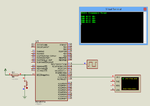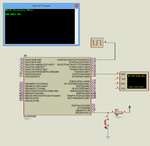RAJPUT VIDISHA
Member level 1
hi...
guys really need help in making frequency counter with pic16f877a...i want to display frequency via UART but its not working ...this is my code
guys really need help in making frequency counter with pic16f877a...i want to display frequency via UART but its not working ...this is my code
Code:
/*
* SIMPLE SERIAL FREQUENCY METER
*
* this program writes one time per second to the RS232 communication line,
* the frequency of the input signal on the RB0 pin
*
* PIC16F877A
* 4 Mhz crystal, XT clock
*
* PORTB.0, in : counter input
* PORTc.6, out : RS232 tx
* PORTc.7, in : RS232 rx
*/
sbit BUZZER at RC1_bit; // Buzzer connections
sbit BUZZER_Direction at TRISC1_bit;
/*
* RAM variables
*/
unsigned long cntr ; // number of RB0 transition
unsigned int ovrflw ; // number of timer0 overflows
unsigned char str[10] ; // display result string
/*
* constant strings
*/
const unsigned char welcome[] = "\r\rRS232 Frequency Meter Ready" ;
const unsigned char unit[] = " Hz\r" ;
/*
* write the s ram string to RS232
*/
void Comm_Write(unsigned char *s)
{
while(*s)
{
Soft_Uart_Write(*s) ;
s++ ;
}
}
/*
* write the s constant string to RS232
*/
void Comm_WriteConst(const unsigned char *s)
{
while(*s)
{
Soft_Uart_Write(*s) ;
s++ ;
}
}
/*
* convert the cnrt long value to string
*/
void Long2str(void)
{
unsigned char i, j ;
if(cntr == 0)
{
str[0] = '0' ;
str[1] = 0 ;
}
else
{
str[0] = 0 ;
i = 0 ;
while(cntr > 0)
{
for(j = i + 1 ; j > 0 ; j--)
{
str[j] = str[j - 1] ;
}
str[0] = cntr % 10 ;
str[0] += '0' ;
i++ ;
cntr /= 10 ;
}
}
}
/*
* interrupt routine called 4000000/256 times by seconds :
* the timer TMR0 is increased each 4 clock cycles (quartz frequency is 16 Mhz),
* and overflows when reseting from 255 to 0,
* calling the interrupt procedure with bit T0IF set
*
* also called on each RBO transition, with bit INTF set
*/
void interrupt(void)
{
if(INTCON.INTF)
{
/*
* RB0 interrupt
*/
cntr++ ; // inc. transition counter
INTCON.INTF = 0 ; // clear interrupt flag to enable next call
}
else if(INTCON.T0IF)
{
/*
* TIMER 0 overflow
*/
ovrflw++ ; // inc. overflow counter
INTCON.T0IF = 0 ; // clear interrupt flag to enable next call on overflow
}
}
/*
* entry point
*/
main()
{
Sound_Init(&PORTC,1);
Sound_Play(1000,100);
Soft_Uart_Init(PORTC, 7, 6, 9600, 0) ; // RS232 on PORTC, bits 7 & 6, 38400 bauds
Comm_WriteConst(welcome) ; // write welcome message
TRISB0_bit = 1 ; // RB0 interrupt pin as input
// T0CON = 0b11001000;
OPTION_REG = 0b01001000 ; // no prescaler
/*
* main loop
*/
for(;;)
{
cntr = 0 ; // clear counters
ovrflw = 0 ;
INTCON = 0b10000110; // T0IF, INTF and GIE enabled
while(ovrflw < 3906) ; // wait 1 second : 15626 = 16 000 000 / 4 / 256, rounded up
INTCON.GIE = 0 ; // stop all interrupts
Long2Str() ; // convert counter to string
Comm_Write(str) ; // write string
Comm_WriteConst(unit) ; // write unit
}
}
//
Last edited by a moderator:

